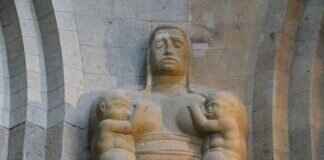Government Deportation of Activist Sparks Controversy and Outcry
In a recent turn of events, the federal government’s attempt to deport Columbia University activist Mahmoud Khalil has stirred up a whirlwind of controversy and dissent. The Trump administration, through a brief memo signed by Secretary of State Marco Rubio, has invoked its authority to expel noncitizens whose presence in the country is deemed detrimental to U.S. foreign policy interests. The memo, obtained by The Associated Press, does not levy any criminal charges against Khalil, a legal permanent U.S. resident and graduate student known for his advocacy on behalf of campus activists during major demonstrations concerning Israel’s treatment of Palestinians and the conflict in Gaza.
Rubio’s memo argues that Khalil’s beliefs, rather than any unlawful activities, warrant his potential deportation. While acknowledging Khalil’s actions as “otherwise lawful,” Rubio contends that allowing him to remain in the U.S. would undermine efforts to combat anti-Semitism globally and protect Jewish students from harassment and violence in America. This stance is based on the belief that tolerating anti-Semitic behavior and disruptive protests threatens significant foreign policy goals. The submission of this memo came in response to a court order from Judge Jamee Comans, who requested the government to present its evidence against Khalil ahead of an imminent hearing on his immigration detention.
Attorneys representing Khalil have vehemently defended his rights, asserting that the Trump administration’s actions amount to an infringement on free speech. The lawyers, Marc Van Der Hout and Johnny Sinodis, criticized the government’s handling of the case, emphasizing the lack of substantial evidence against their client. They have condemned Khalil’s arrest and subsequent detention as unjust, with no credible proof indicating any danger or threat posed by his presence in the U.S.
In the midst of this legal battle, Khalil, a 30-year-old Palestinian born in Syria, finds himself separated from his wife, an American citizen, who is on the verge of giving birth. His personal struggle against accusations of anti-Semitism and political persecution unfolds against the backdrop of broader governmental crackdowns on dissenting voices. Despite facing the prospect of deportation, Khalil remains resolute in his commitment to uphold his principles and advocate for his beliefs.
Expert Insight on the Situation
Legal and Human Rights Implications
The current scenario involving Mahmoud Khalil raises significant legal and human rights concerns that demand critical examination. As legal experts and human rights advocates weigh in on the implications of the government’s actions, the fundamental rights of individuals like Khalil are brought to the forefront. The intersection of immigration law, free speech protections, and foreign policy considerations underscores the complexity of this case and its broader ramifications.
Impact on Academic Freedom and Activism
The government’s targeting of activists like Khalil and Yunseo Chung, another Columbia student facing deportation, raises questions about the limits of academic freedom and the right to engage in political activism. The Trump administration’s crackdown on dissent within university settings, coupled with the revocation of visas for students critical of Israeli policies, highlights the challenging landscape for individuals expressing dissenting views. By delving into the impact on academic freedom and the right to protest, a deeper understanding of the broader implications of these actions emerges.
The unfolding narrative surrounding Mahmoud Khalil’s deportation case underscores the delicate balance between government authority, individual rights, and free expression. As the legal proceedings continue and public scrutiny intensifies, the case serves as a poignant reminder of the ongoing struggles for justice, freedom, and human rights in the face of political adversity. Through examining the personal stories, legal arguments, and broader societal implications at play, a nuanced portrait of this complex issue emerges, inviting reflection and critical engagement from all stakeholders.














